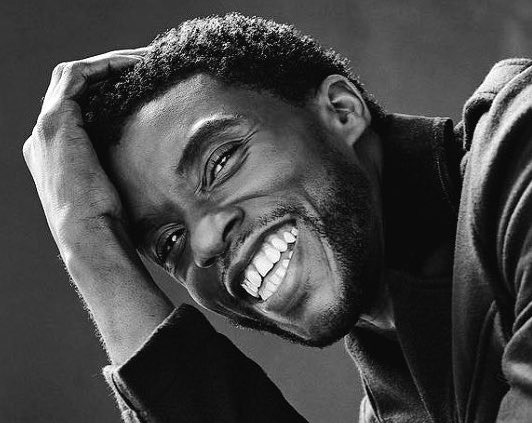In the past seven years, there has been few actors to not only be so consistent as a standout star, but also a constant presence within so many groups in the entertainment business, primarily the Afro-American community and comic book movie world. The late Chadwick Boseman, who passed suddenly on Aug. 28 after a four-year battle with stage three and four colon cancer, represented a variety of symbols to different people all around the world. His death is a big loss, but more importantly, his story and the way he carried himself and persevered during hard times further solidifies how much of an inspirational figure he already was.
Boseman’s big break arrived loudly. In 2013, he starred as the baseball legend Jackie Robinson in 42, a retelling of Robinson’s path to breaking the color barrier in American’s favorite pastime. This role not only brought him to major success but was the start of a historic run of playing some of the greatest Afro-American historical and fictional characters. Seeing Black figures come back to life on the big screen is an opportunity that many in the Afro-American community take very seriously, so it was no surprise that my own family didn’t hesitate to buy tickets for this movie on the first weekend. From my own lens, I recall the excitement of going with my family to see 42, completely unaware of Boseman’s name. However, the face, the composure and the pure acting ability and talent carried over to his next big film. For Get on Up, the 2014 biopic of the Godfather of Soul James Brown, my family and I had the same feeling as we had for 42. As I watched trailers, I began to notice, “Is this the same guy that played Jackie Robinson?” The idea of someone playing multiple historical figures that quickly was odd at the time, but to no surprise Boseman again knocked out the performance. It seemed like he could be anybody.
What made Boseman so special was his ability to fully become the role he was casted for. When he played Jackie Robinson for two hours, he was Robinson. When he played James Brown, he again immersed himself in the character and setting. It never seemed like there was a “classic” Boseman acting style or performance, but instead a man who would become the person and add a dash of his magic to it. Nothing about the performance felt like Boseman, but they all provided the same feeling of warmth and attractiveness. He did the same thing again as a young Thurgood Marshall in Marshall. He didn’t even necessarily have to look exactly like the legendary Supreme Court Justice, but because Boseman is so convincing, it works each time. He can seamlessly blend in to “being” other people and still make his presence known. This point became even more obvious when he received the casting of his career.

Boseman is perhaps most well known for his role as a superhero in Marvel’s Black Panther. However, his film credits also include playing Jackie Robinson and Thurgood Marshall (Photo courtesy of imdb.com)
Boseman’s casting as T’Challa in Black Panther didn’t come to a surprise due to his wealth of performances as high-level figures. Upon hearing his casting, however, it made me wonder at the time why Boseman continues to be selected for these major figures over and over again? Was he the Hollywood token black star to play all characters in sight? These questions would soon be answered in the same manner as his other roles during the four-movie streak from Captain America: Civil War to Avengers: Endgame, including stand alone Black Panther film.
In comic books, King T’Challa was commonly known as a no-nonsense leader who would only join a group like the Avengers so he can spy on them. He is vicious, tactical and most above all would do anything to protect his nation of Wakanda. Boseman’s take differs from this typical portrayal because it’s a testament to his personality and what he had already represented to millions in the world. From the moment Boseman first made his appearance as the Black Panther, again he blended into the character while making it his own. This T’Challa was warm, heartfelt and provided a symbol of hope, not only as the newly crowned King to his people, but to viewers who swarmed in packs to see the films. Black Panther was a worldwide cultural event unlike anything seen before for a hero’s solo film. The movie attracted comic book movie fans looking to see yet another great addition to the Marvel Cinematic Universe (MCU), movie watchers looking for the next big attractive film, and many of African descent around the world, kids and adults alike, who were able to watch someone who looked like them play the titular character in a big-budget superhero film. Boseman avoided the Hollywood stereotype of a struggling black man from the hood (done over and over again), but instead played a wealthy King who stands for justice and provides hope, vanquishing his enemies.
Boseman’s loss is a great one because of what he represented. He was a versatile actor who played some of the most significant Black figures of the past 75 years and gave us his heart on each and every performance. A loss of this magnitude leaves a void. All of the people around the world who found their superhero are now gripping with such an unexpected circumstance. However, even in his death, he provided a last lesson that inspires yet again. Through the entire height of his career, Boseman was suffering, but pushed through and didn’t look to give anyone a single reason to worry about him. This method doesn’t work for everyone but gives another reason to look at for why he was so special. Boseman’s roles will never be forgotten, and neither will his own character.










